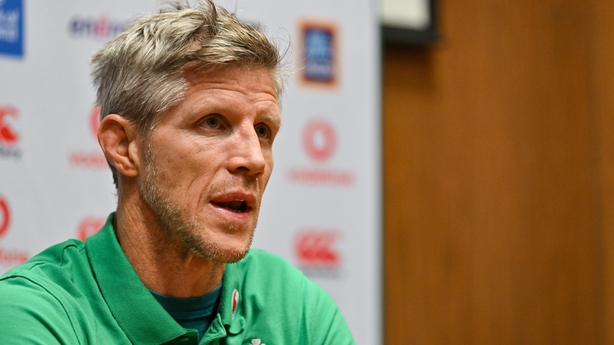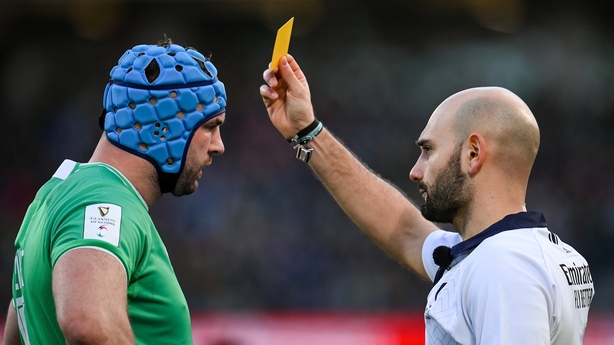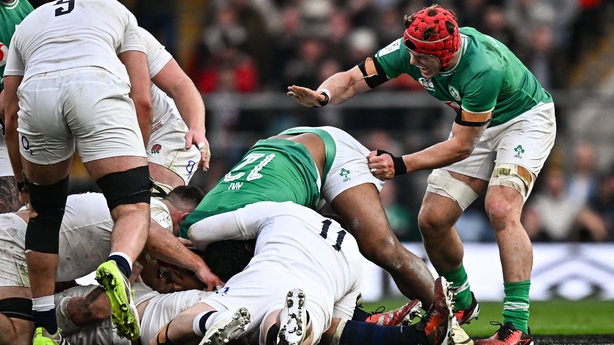Yellow cards are the new Dublin Buses.
From the summer of 2021, right through to the end of the Rugby World Cup, Ireland gave up three yellow cards across a total of 29 games. It was, by some distance, the cleanest record in the game.
In the space of four matches, their halos have turned to horns.
From averaging a yellow card once every nine-and-a-bit games, they've now had four in their last four, a consequence of conceding 45 penalties in that period, which is the highest in this year’s championship.
Having won comfortably in spite of a high penalty count in each of their last three games, that indiscipline came back to haunt them at Twickenham on Saturday, as their Grand Slam hopes came tumbling down against an inspired England.
Their penalty count of eight was actually a reasonable drop on the previous three games, but the context and location of those indiscretions proved costly.
Twice in the opening half they conceded penalties under pressure on the edge of their own 22, while another followed in the second half when Peter O’Mahony was yellow-carded as he attempted to slow England down following Ben Earl’s break up the middle of the pitch.
"The yellow card is him trying to do something for the team and we know it’s the wrong decision, but it could have been anyone in that situation trying to make up for a linebreak," defence coach Simon Easterby (below) said.

While Ireland's defence had been rock solid up until last weekend, their tendency to concede penalties in their own 22 has been a running theme in the Six Nations, and the main reason why they’ve seen their sin-bin count spike.
In their opener against France, eight of the 13 penalties they gave up can be attributed to two small flurries of French pressure in and around the Irish 22 either side of half time, with France scoring on both occasions, while similarly against Wales they conceded their penalties in bunches, with James Ryan’s late yellow in that game coming off the back of three in three minutes, with multiple other advantages being played in that passage of play.
In addition to the three penalties on the edge of the 22 against England, they had also given up an advantage in the build-up to the hosts’ third try through Ben Earl, while Marcus Smith was able to attempt a pressure-free dropgoal to win the game, safe in the knowledge that he was playing with two separate advantages, one just to the left of the posts.
The second of those advantages was given up by Tadhg Beirne, with the second row not hearing the instructions of referee Nika Amashukeli who could repeatedly be heard telling him to release the ball at the ruck.

By then, England already had a free shot on the way after Ireland had infringed in the corner following England’s break down the touchline.
And while Beirne admits Ireland made some "stupid decisions" under pressure, it was their own poor defence that led to them.
"When teams are putting you under pressure of course you’re going to be more likely to give away penalties because you’re on the back foot," the second row said.
"We can’t be desperate, which at times we were against England. When you get desperate you make stupid decisions and you can go off on your own and go out of the system and that can have a big knock-on effect."
The flip-side of Ireland’s aggression at the breakdown is that for every penalty they give up in their own territory, there's probably a penalty or a turnover won from that same need to compete.
Against Wales, moments after Beirne returned from his own sin-binning, he made up for it by disrupting a Welsh maul, while against England his quick instincts at the breakdown saw him pinch a turnover close to his own half. Similarly, Josh van der Flier came up with two vital breakdown penalties in his own 22 on Saturday, one in each half.

Finding the balance between competing for turnovers and making the right decisions, particularly in the heat of a relentless Six Nations game, is like walking a tightrope on rollerskates.
"I don't think it’s a massive issue, but it’s something we continually reflect on and see how we can do things better, decision-making around the tackle on both sides of the ball is huge for us as a team, and it’s something we reflect on, whether we’ve won or lost. That hasn't changed," Easterby adds.
"Sometimes this campaign, we’ve probably conceded penalties when we haven't needed to, when we’ve probably dipped into to something we didn't need to, or chance our arm a little bit.
"Yes, there's time when opposition [have] momentum, you might feel that you have to do something to address that and change the momentum. In those cases it’s important that we trust each other and don't go and go off on our own and try solve things. We can do that better together."
Watch Wales v Italy in the Guinness Six Nations (2.15pm) and France v England (8pm) on Saturday on RTÉ2 and RTÉ Player, follow a live blog on France v England on rte.ie/sport and the RTÉ News app
Follow a live blog on Ireland v Scotland in the Guinness Six Nations on Saturday from 4pm and listen to live commentary on Saturday Sport on RTÉ Radio 1
Watch Wales v Italy and France v England in the Under-20 Six Nations on Friday night from 7.20pm and 7.50pm on RTÉ Player


